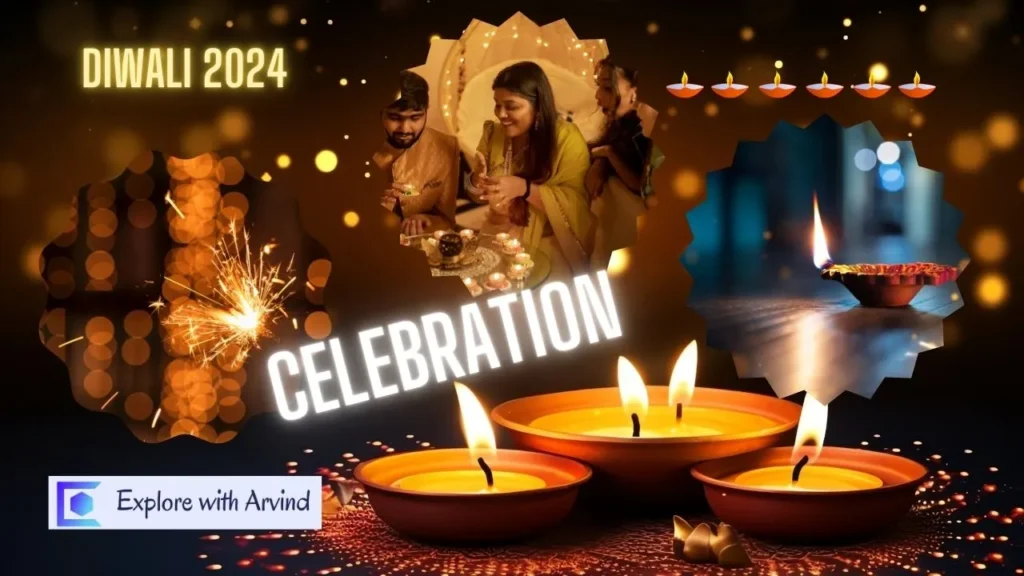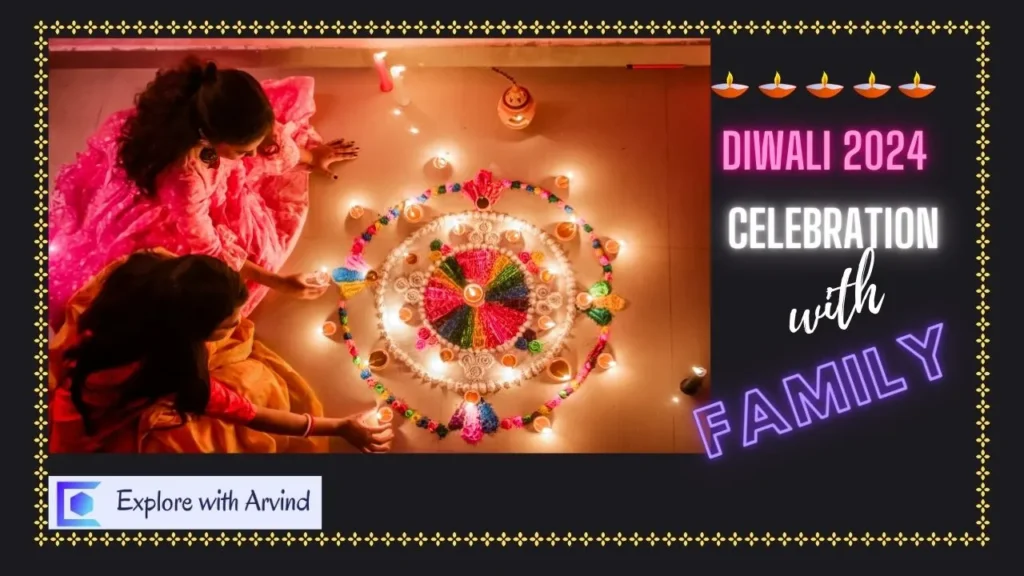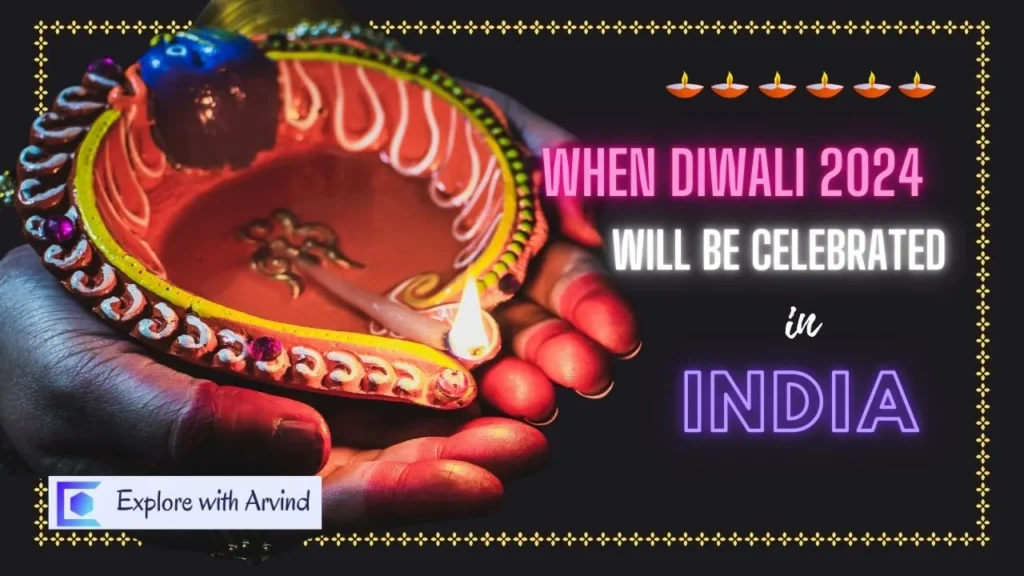Table of Contents
ToggleThe Ideal Day to Celebrate Diwali 2024 - October 31 or November 1?

Introduction
Diwali, also known as Deepawali, is celebrated according to the Hindu lunar calendar, typically falling on the Amavasya (new moon) of the month of Kartika, which is usually in October or November. This Amavasya night marks the darkest night of the year, symbolizing the victory of light over darkness and knowledge over ignorance. The exact date of Diwali varies each year due to the lunar cycle, but it generally occurs 15 days after the Sharad Purnima, a full moon night in the Ashwin month.
The festival is spread over five days, with each day having its unique rituals and significance, from Dhanteras to Bhai Dooj and Chitragupt Pujan. This time of year is considered highly auspicious in Hindu culture, as families come together to worship, light diyas, and celebrate the abundance and blessings in their lives.
Diwali, also known as Diwali, is one of India’s most significant and widely celebrated festivals. Known as the “Festival of Lights,” Diwali is celebrated with grandeur, joy, and reverence across India and among Hindus worldwide. The festival is marked by vibrant decorations, worship of deities, exchanging sweets, lighting diyas, and sharing in the spirit of togetherness. Let’s delve into the rich heritage, traditions, and significance of Diwali, exploring its origins and the various layers of meaning it holds.
The Origin of Deepawali
Diwali’s origins trace back to ancient India and Hindu mythology. The word “Deepawali” itself is derived from the Sanskrit words “Deep” (lamp) and “Avali” (row), meaning a “row of lamps.” This name signifies the lighting of diyas and lamps, symbolizing the triumph of light over darkness, knowledge over ignorance, and good over evil.
The Mythological Significance
The Return of Lord Rama
The most well-known story associated with Diwali is the return of Lord Rama to Ayodhya after 14 years of exile. According to the Ramayana, Lord Rama, along with his wife Sita and brother Lakshmana, returned to his kingdom after defeating the demon king Ravana. The people of Ayodhya welcomed him by lighting oil lamps throughout the city, marking the beginning of Diwali celebrations.
Lord Krishna and Narakasura
In another significant story, Lord Krishna defeated the demon Narakasura, who had created havoc in the heavens. This victory of good over evil is celebrated as Naraka Chaturdashi, one of the days of Diwali.
Goddess Lakshmi’s Birthday
Diwali is also believed to mark the birthday of Goddess Lakshmi, the goddess of wealth and prosperity. This aspect makes it a festival of abundance, with families worshipping Lakshmi and praying for wealth, health, and prosperity.
The Spiritual Meaning of Deepawali
Beyond its mythological stories, Deepawali holds a deep spiritual significance. It represents inner light and the victory of righteousness and moral integrity over falsehood and ignorance. Lighting diyas during Diwali signifies an awakening of inner peace and the dispelling of darkness in our lives.

Preparations for Diwali
Cleaning and Decoration
Families start preparing for Diwali by cleaning and decorating their homes. This tradition symbolizes purification, making the home ready to welcome positive energy and blessings. People decorate their homes with rangolis, colorful designs made from powdered colors, flowers, and rice, adding a festive atmosphere.
Shopping for Festivities
Shopping is a significant part of Diwali preparations, as people buy new clothes, jewelry, and gifts. Markets are filled with unique items and decorations, adding to the excitement. Dhanteras, the first day of Diwali, is considered an auspicious time for purchasing valuable items, especially gold and silver.
Rituals and Celebrations of Diwali
Dhanteras
Dhanteras marks the first day of Diwali and is dedicated to the worship of Dhanvantari, the god of health and healing. On this day, people purchase precious metals and household items, as it’s believed to bring good fortune.
Choti Diwali (Narak Chaturdashi)
Also known as Choti Diwali, this day celebrates the victory of Lord Krishna over Narakasura. Traditionally, people clean their homes, light diyas, and perform small rituals to ward off negative energies.
Lakshmi Puja
The third and most important day of Diwali is Lakshmi Puja. On this day, families worship Goddess Lakshmi and Lord Ganesha for wealth, prosperity, and removal of obstacles. After the puja, people light diyas and burst fireworks to celebrate.
Govardhan Puja
Govardhan Puja is celebrated on the fourth day of Diwali and commemorates the event when Lord Krishna lifted the Govardhan Hill to protect villagers from torrential rains. On this day, people offer gratitude to nature and perform rituals to honor the day.
Bhai Dooj
The fifth day of Diwali is Bhai Dooj, a festival that strengthens the bond between brothers and sisters. Sisters pray for their brothers’ well-being, and brothers promise to protect their sisters, symbolizing love and care in families.
Chitragupt Puja
Chitragupt Puja, celebrated on the fourth day of Diwali, is dedicated to Lord Chitragupt, the divine accountant in Hindu mythology who keeps records of human deeds. Worshipping Chitragupt on this day is significant, especially for those involved in business and accounting. Families pray for wisdom, honesty, and prosperity in their work, and they seek blessings to live a life of integrity. This puja is particularly important in regions like North India, where it’s customary to clean and organize financial records, a practice symbolizing respect for order and truth in one’s affairs.
Traditional Sweets and Festive Foods
Diwali celebrations are incomplete without the sharing of sweets and traditional foods. From laddoos to barfis, and gujiyas to kheer, these sweets embody the joy and sweetness of the festival. Families and friends exchange these sweets as a gesture of goodwill and love.
Lighting Up Homes with Diyas and Candles
Lighting diyas and candles during Diwali symbolizes the victory of light over darkness. People adorn their homes with rows of diyas, creating a mesmerizing view. This tradition represents the light within each of us that has the power to overcome challenges.
The Cultural Importance of Diwali
Diwali fosters cultural unity, transcending regional boundaries and bringing people together. The festival encourages people to come together in celebration, regardless of their background, making it a unifying event in India’s diverse cultural landscape.
Social Impact of Diwali
Spreading Joy and Unity
Diwali is a time of sharing joy, reconnecting with loved ones, and mending relationships. It brings communities together, fostering a sense of unity and mutual respect.
Charity and Giving Back
An important aspect of Diwali is the emphasis on charity. Many people choose to help the less fortunate during this time, whether through donations, distributing food, or other acts of kindness, embodying the spirit of giving.
Economic Impact of Diwali
Boost to Retail Markets
Diwali is one of the most profitable times of the year for retailers in India. From clothing and jewelry to electronics and home decor, there’s a surge in demand across various sectors, providing a significant economic boost.
Role of Artisans and Local Businesses
Diwali promotes traditional arts and crafts, as many people prefer handmade decorations and items from local artisans. This support helps keep traditional Indian craftsmanship alive and sustains livelihoods.
Environmental Concerns and Eco-Friendly Celebrations
With growing awareness about environmental impacts, many people are choosing eco-friendly ways to celebrate Diwali. Using clay diyas, reducing firecrackers, and opting for sustainable decorations are just a few steps people are taking to ensure a greener festival.
Global Celebrations of Diwali
Diwali is celebrated not only in India but also in countries with significant Hindu communities, such as Nepal, Sri Lanka, Malaysia, and Trinidad & Tobago. The festival has gained global recognition, with cities around the world hosting vibrant Diwali events.
Diwali and Its Significance in Modern Times
In today’s fast-paced world, Diwali provides a time to pause, reflect, and reconnect with family and traditions. It reminds us of the timeless values of kindness, generosity, and the importance of nurturing relationships, making it more relevant than ever.

Confusion on Diwali 2024
In 2024, Diwali is anticipated to be observed on October 31, though a subtle discourse among astrologers persists due to the overlap of the Amavasya Tithi, the New Moon phase, which bridges both October 31 and November 1. As per Hindu customs, the sacred Lakshmi Puja during Diwali is traditionally conducted during the Pradosh Kaal—an especially favorable period that commences after dusk on Amavasya. This interval is profoundly significant, as it is believed that Goddess Lakshmi’s blessings are most accessible during this juncture.
A recent assembly of astrological authorities and religious scholars at the Diwali Nirnay Dharmasabha reaffirmed that October 31 is the more auspicious date for Diwali in 2024. Their determination rests on the alignment of the Pradosh Kaal on October 31, which stretches from 5:12 pm to 7:43 pm—offering an abundant span for conducting the Lakshmi Puja with reverence. Conversely, on November 1, the Amavasya Tithi concludes at 6:16 pm, abbreviating the Pradosh Kaal and rendering it less optimal for the rituals.
The concurrence of favorable timings and the New Moon has led most religious leaders to endorse October 31 as the ideal date for Diwali observance this year, aligning with time-honored practices and the traditional veneration of divine blessings.
Conclusion
Diwali or Deepawali is more than just a festival; it’s a beautiful reminder of the power of light, love, and unity. Celebrated with immense fervor, Diwali brings together families, communities, and cultures in a shared spirit of joy. Its rich mythology, social significance, and cultural impact make it one of the most cherished festivals worldwide.